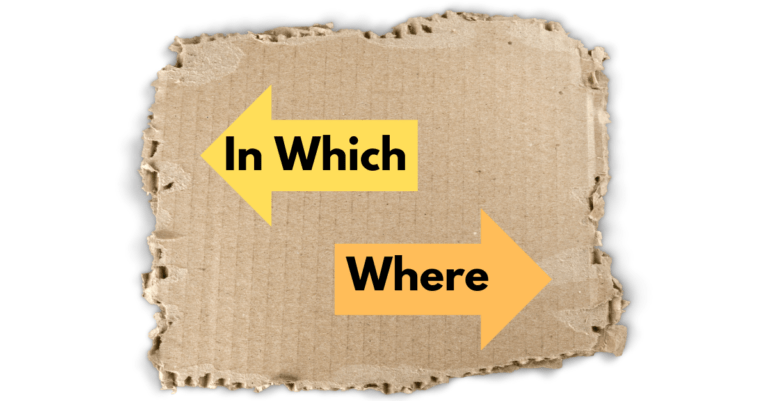Today, we’ll be looking at two constructions that are correct, but which one you choose depends on your audience.
‘In which’ versus ‘where’
The expressions that concern us today are “which” and “where.” We’ll be comparing sentences like these: “This is the store at which I met my friend” and “This is the store where I met my friend.” As you can probably guess, “which” is more formal than “where.”
Relative pronouns
In the two sentences about the store, the words “which” and “where” both function as relative pronouns. Relative pronouns, such as “who” and “that,” introduce dependent clauses (1). So in the sentence “The dog that I adopted needed its shots,” the clause “that I adopted” is a dependent clause headed up by the relative pronoun “that.” The relative pronouns “which” and “where” specifically describe place.
When to use ‘which’
If you wanted to discuss where you adopted the puppy, you might say, “The pound at which I found Spot was on State Street.” That’s a pretty formal-sounding sentence, though. You might say that sentence in a courtroom or in another formal situation.
Other than maintaining formality, there are two valid reasons you might want to use “which” instead of “where.” Many times, you can add a preposition before the relative pronoun “which” to make your sentence quite precise (2). For example, “The house at which I saw you” has a slightly different meaning from “The house in which I saw you.” If you use “where,” you lose the subtle distinction: “The house where I saw you.”
The other reason you might want to use “which” is to avoid using a preposition at the end of a sentence, which is considered informal. For example, the sentence “This is the desk in which the papers are stored” is probably more appropriate to say in a formal setting than its informal counterpart: “This is the desk that the papers are stored in.” Some sticklers might object to that informal sentence. However, if you are talking informally, it is fine to end a sentence with a preposition or to use “where” instead of “in which,” as here: “This is the desk where the papers are stored.”
If you are talking informally, it is fine to end a sentence with a preposition or to use “where” instead of “in which,” as here: “This is the desk where the papers are stored.”
When to use ‘where’
Think back to the puppy sentence we said at the beginning. You probably wouldn’t say “the pound at which” to a friend in normal conversation. You would most likely say, “The pound where I found Spot was on State Street.” You might also find yourself saying, “I found Spot at the State Street pound,” bypassing the “which” or “where” conundrum altogether.
Another time you would probably favor “where” over “which” is when you’re using an informal contraction in your sentence. Take a sentence quoted in Garner’s Modern American Usage. Mr. Garner says, “In the following example, the contraction ‘I’ve’ might not comfortably fit in the same sentence as ‘in which’—hence ‘where’ is justifiable: ‘I’ve deliberately chosen an example where this unspeakable cluster did not stand out’” (3). I’m not sure what cluster this person is talking about, but that is irrelevant for our current discussion. We’re just pointing out that a formal “which” doesn’t sound right alongside an informal “I’ve.”
It’s your decision but beware
Every time you write something, you as the author have to decide which words or phrases are appropriate. So it’s up to you to decide whether to use “which” or “where” in your particular sentence. If your audience expects formal grammar, use a “which” construction. If your audience is more relaxed, you can use “where.”
If you do choose to use “where,” though, you need to be aware of one common error. When you use “where,” you need to ensure that you’re talking about place, not time. For example, it would be incorrect to use a form of “where” in this sentence: “He was born somewhere around 1970.” The year 1970 is a time, not a place, so you would have to say, “sometime” instead of “somewhere.”
References
- 1. Stilman, A. Grammatically Correct. Cincinnati: Writer’s Digest Books, 1997, p. 244.
- 2. Woodham, Roger. “Preposition + Relative Pronoun. BBC World Service. (accessed August 26,2021).
- 3. Garner, B. Garner’s Modern American Usage. Oxford: Oxford University Press, 2003, p. 830.




